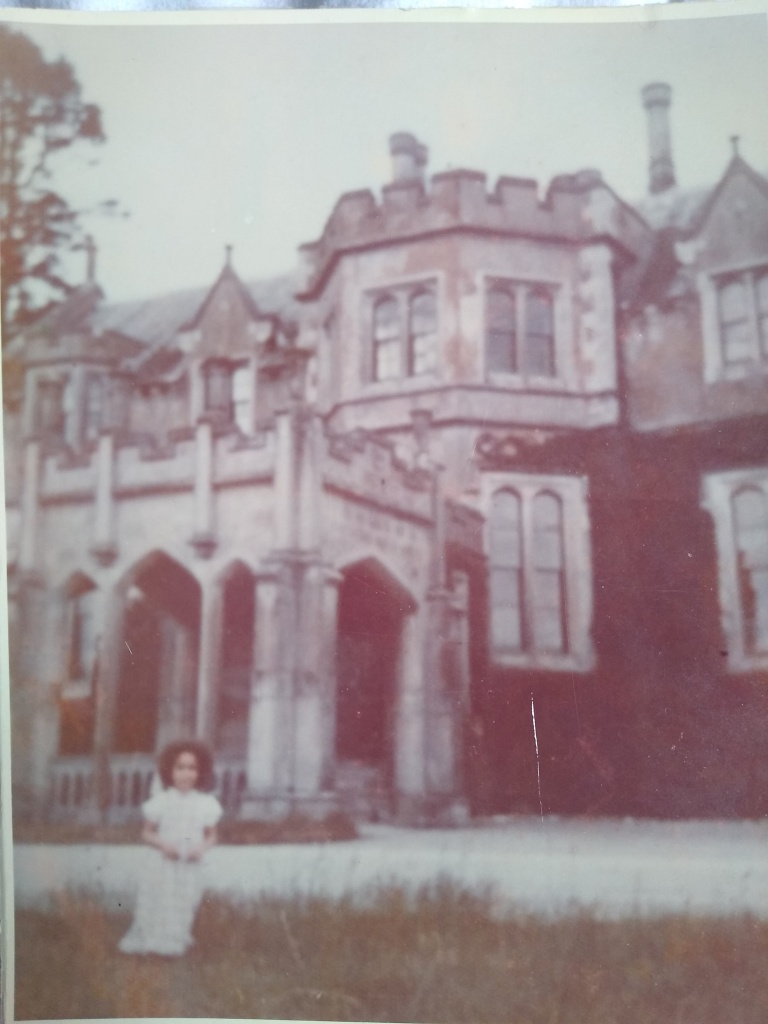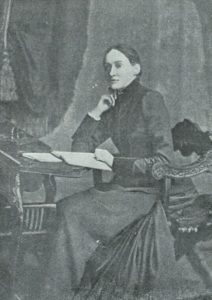Roots of the Present: Memories of My Grandmother Mary Manning
By Lucien Senna

I remember it vividly, as though it was this past summer. I was only seven years old and it was one of three joyous summers I spent in a house rented by my grandmother Molly Manning. It was a pink Georgian house in Sandycove, overlooking the sea, where my mother, sister, brother and me stayed to be near my grandmother’s house on Herbert Road. Only one particular summer’s day stands out as disturbing. I still have a faded colour photo of it. I am standing in a light pink dress with ruffled short sleeves. My hair is a wild crown of frizzy brown curls and I’m posed hesitantly in front of an imposing grey “castle.” The year was 1976. The “castle” was Glendalough House. It was early August. An avid reader of fairytales, I was eagerly looking forward to this day. Upon arrival, my grandmother’s brother-in-law, “Uncle Bobby” Childers, who married her late sister Christobel, urged me to explore the grounds of his house while the adults sat down to talk. I was living a bygone dream.
“Don’t stray too far beyond the stables.” My grandmother cautioned, a slight smirk on her face.
“But why Grandma?” I asked nervously expecting to hear a story about wild beasts in the woods.
“That’s where the ghosts are darling!” she teased, with a straight face.
“What ghosts? Who has seen them? Are you sure they’re there?” I was a great one for interrogation.
“Nearly everyone who’s been by the stables and barn has seen them at one time or another.” chimed Bobby, joining in on the prank.
“Now go!” My mother said, the adults wanting to have a private chat. My younger sister who was far less interested in fairy stories, didn’t stray as far as the kitchen once she heard of ghosts. My brother, who was still a toddler, sat in my mother’s lap. The sky was overcast yet the trio sat outside at a bronze summer table, with cheese, crackers, and gin and tonics.
An expanse of scarlet poppies in bloom stretched to their left bordering the glass hothouse.
I tarried towards the garden, looking back now and then for reassurance from the grown-ups. They all looked bemused, particularly my grandmother, who was fond of jovial entertainment and games. My mother was completely at ease, happier than I’d seen her in a long time.
“It’s right that way dear.” Bobby pointed to the right, in the opposite direction. A diminutive, dapper man, impeccably turned out in a tweed three piece suit, Bobby went inside the house to collect more drinks. He was extremely taciturn and solemn, having lost his father at a young age, now prematurely was a widower. His children were all grown-up and living in England or the USA. In Boston, which was really the only city I’d known until then, I’d never encountered a character like Bobby except on television. He was witty, but rarely laughed himself.
I gazed hesitantly towards the barn listening intently to the sound of horses coming from the nearby stables.
“And don’t worry about the man in the stables. He’s terribly kind, and just looks after the horses for me.” Bobby called out, egging me on and the same time adding to my fears.
As I approached the old stables, which had planks missing from the roof, I saw a tall dark haired man with a peak cap and a green Burberry jacket. He just nodded at me and returned to grooming one of the horses. I was beginning to believe this had all just been a ruse or a wind-up to get me away from the grown-ups gossiping. I strolled further into a grove of towering trees where I could hear water gurgling. There was a fountain stream with an elegant curved wooden bridge above and rocks arranged in a pattern beside a nearby bench. This was the Japanese garden and I stopped to look down at the puffed out koi swimming languidly at the bottom of the stream.
How exquisite! There was nothing to fear. This was a historical wonderland. I sat on the bench daydreaming, losing track of time. After rising from the bench, I turned back towards the house and approached the stables. I peeped inside but the tall man was no longer there with the horses. And suddenly as I neared the barn, I caught a glimpse of a small man in odd old-fashioned clothes. He was emaciated, with sunken in cheeks, a filthy face and ragged pants held up by a string. He had no shoes. He stretched his open palms out to me cupped, gesturing to his mouth, begging for food. I turned, petrified and fled. When I looked back after a few seconds, he’d disappeared.
By this point, I’d been gone some time and I could hear my mother calling my name. I ran towards the front of the house but found myself at the back. I was lost. Now all three adults were shouting my name in turns. I followed the sound of the voices.
When I found them standing in front of the house, my mother was irritated and my grandmother furious. Children were meant to be seen and certainly not heard or troublesome.
“Where were you?” demanded my mother.
“I saw a strange man near the barn!” I insisted
“I told you there’s a man working in the stables!” Bobby exclaimed, dismissing my claim.
“No. It was another man. He was so skinny and not even wearing shoes!”
My grandmother and mother looked at each other with a mixture of disbelief and scepticism.
“Tell me what this dishevelled creature looked like,” my grandmother insisted. She was a notorious inventor of caricatures. But she loved a good story.
“ I’d just been looking at the goldfish in the stream when I went to the barn and there he was. The skinny man. The man in the stables was gone. The skinny man was wearing rags. He looked like a skeleton. His face was dirty and he was really hungry.”
“Hungry? Did he ask you for food?” My mother was incredulous.
“No, he didn’t speak but he put out his hands like he was begging and pointed to his mouth.” I looked into three sets of perplexed eyes.
Bobby let out the first chuckle I’d ever heard from him. “My dear, you have such a vivid imagination. Now come inside and have some sandwiches in the kitchen with your sister.” He gestured toward the kitchen. I was completely silent as I ate the sandwiches. I hated salmon, but ate a couple to be polite while my sister questioned me about the skinny man.
On the ride back to Herbert Road, my mother and grandmother began to explain to me that when there had been the famine in Ireland, several hundred poor people came to Glendalough House, begging for food, but were turned away and subsequently died. Some were rumoured to haunt that part of the estate. At that point, I insisted my mother pull over the car and was violently sick from the salmon and the encounter with a possible ghost.
Later on as sunset fell, at my Grandmother’s house in the garden, as my sister and I played by her goldfish pond, I overheard my grandmother remark philosophically,
“The trouble is we all think we have time, when time really has us.”

All Rights Reserved: Lucien Senna 2019
Biography:

My name is Lucien Quincy Senna. I am a legal historian, poet, essayist, and political activist. I have dual Irish/US citizenship and have lived mainly in England since I was 19. I have have a degree in Jurisprudence from the University of Oxford (as well as a BA in English and American Literature from Harvard University). I am a single mother to two young adults and one teenager. My poems are published in a collection which is available on Amazon and also online. My poetry appears in a number of anthologies. I also have poems published under my pen name “Anora Mansour”, one of which was recently published in the Perch Journal at Yale University. Poems of mine can also be found on the Irish women’s website Poethead.
Would you like to submit a blogpost? Check out our guidelines here or email Dr Deirdre Flynn.



